The Naked Scientists are joined by biologist Kate Feller, physicist Jess Wade, biochemist Andy Holding and Space Boffin Richard Hollingham, to field your science questions. This week, find out what happens to muscles in space, how to rid a car of flatulence, and whether any animals can become invisible. Plus, cyber security expert Paul Harris talks to Chris Smith about the recent cyber attacks - what happened, and how we can protect ourselves.
In this episode

04:57 - What's the point of going to the moon?
What's the point of going to the moon?
Chris Smith put this question to Space Boffin Richard Hollingham.
Richard - I would say there are three reasons. Reason one is resources: so you could look for helium 3; we could use that on earth to power fusion reactors. You could maybe look for rare earth elements on the moon. But, actually, to bring stuff back from the moon it’s going to be a huge amount of energy, probably not worthwhile. You could use the moon’s resources, so water, the rock there to build bases or even to power future spacecraft, but that’s slightly self-serving.
I would say the main point of going to the moon is because it’s the next thing. It’s the over the hill; it’s across the river; it’s over the sea. It’s what we do as humans; it’s aspirational.
And then you could look for all the other reasons, all the spin-offs we’ve got from space like the computers, electronics, microwaves…
Chris - Wifi…
Richard - Imagining technology, wifi, all these…
Chris - Velcro…
Richard - All these sorts of things.
Chris - Biros…
Richard - Well actually…
Chris - Is that true?
Richard - The velcro’s sort of not so true.
Kat - Smoke detectors.
Chris - smoke detectors - really?
Kat - and carbon monoxide detectors.
Chris - Were they invented solely for the purpose of space?
Kat - Yes.
Richard - Can I throw one more thing in - is inspiration. The people inspired by space, the kids inspired by space. You look at two of the biggest entrepreneurs doing space right now - Elon Musk and Jeff Bezos both inspired by the moon landings. They are the reasons to go to the moon.
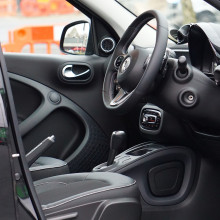
06:44 - How do you rid a car of a fart?
How do you rid a car of a fart?
Chris Smith put this question to Jess Wade from Imperial College London.
Chris - I thought that Jess, never in your whole career did you think that you would be coming to reach this moment? To apply the rules of physics and fluid dynamics to ventilate a car?
Jess - Especially to be asked from California - I thinks that’s brilliant. There’s obviously a few different issues here about how you get a fart out of a car. And one of them is about which windows you choose to open, the other one is what kind of temperature the fart is at, as disgusting as that sounds, because that affects how quickly it expands when it comes out into the atmosphere? Then the other one is which kind of gases are in the air already?
When the fart occurs: it comes out, it expands, it moves forward to the front of the car because that’s the region of lower pressure if you’re moving along because the higher pressure region is at the back.
Chris - Why is that?
Jess - Because the air is accelerating forwards, so it’s pushing backwards increasing the pressure at the back.
Chris - You’re assuming the car is getting faster?
Jess - I’m assuming here that the car is moving forwards…
Chris - So the air is being left behind a bit inside the car?
Jess - Exactly.
Chris - So the farts going to make it’s way towards the front so the driver is going to experience it more than the back seat.
Jess - Exactly.
Andrew - Well that’s made me realise the worst thing you can do when someone farts in a car is try and accelerate away from it.
Chris - Yeah, so you should put the brakes on - is that what you’re saying?
Jess - It is the worst thing you can do. And if you’re in the passenger seat and you’re the one who’s done the fart it’s going to be very obvious, very quickly because it’s going to go forward to the driver. If you try and open the windows, which is what you’d probably try and do, there’s interesting things that happen with kind of fluid flow. You’d think if you were this little air particle in the car you’d want to rush out, right? As soon as you get outside you realise very quickly that the air there is not actually at the lower pressure you assumed it was at and it’s much lower pressure inside the car, so the air there isn’t moving with you, it’s outside. So you rush back into the car and so the smell doesn’t leave if you just open one of the windows, which I think is interesting.
Chris - So you need to open more than one window then?
Jess - To get this fart out - Karen in California - you have to slightly open the front window and open the back window so that you create a flow through the car. You can get really interesting graphics of it, a kind of turbulent flow going through these two open windows.
Chris - I’m forming a few mental images right now.
Jess - I’m not going to make any judgement here. You could also get smart materials to make your car seats out of that absorb odours, so smart materials and materials that have a function when you do something to them. Materials like ones that you can jump up and down on and then they produce electricity pseudo-electric materials.
You can also get clever ones that can trap the smells. Smells are usually carbon based molecules and you can get ones that get trapped in the fabric so you don’t smell those at all. So that is one option but the other option is, obviously, also doing this with the windows.
Chris - OK. So a front window open a bit. A back window open a bit. And that should achieve the right pressure differential to vent the fart?
Jess - Entirely right.
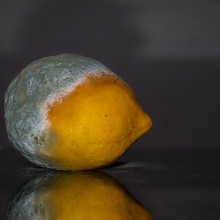
09:50 - Why do we lose our appetite when we see gross stuff?
Why do we lose our appetite when we see gross stuff?
[transcript to follow]
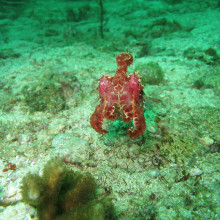
12:58 - Can any animals become invisible?
Can any animals become invisible?
Transcript to follow...

14:58 - What's your favourite accidental scientific discovery?
What's your favourite accidental scientific discovery?
Chris put this question to physicist Jess Wade from Imperial College London, to biochemist Andy Holding and biologist Kate Feller from Cambridge University, and to Space Boffin Richard Hollingham...
Chris - A few weeks ago, here on the Naked Scientists, we reported on the discovery that the caterpillar of the wax moth can eat plastic bags. Remarkably, this was found out by accident! One day a researcher (who keeps bees as a hobby) was removing the caterpillars from her beehive and found they’d made holes in the bag she’d put them in! And it got us thinking about science done by accident, and I’m curious what else has been discovered like this.
Jess, what’s your favourite accidental discovery?
Jess - I have a few actually. There are so many accidents in physics that make magical things happen, one of which is Post-it notes. Scientists who were trying to make glue were obsessed with making the world’s strongest glue. Someone called Spencer silver was trying to make this really, really strong glue and he was systematically failing, which is great by the way in science!
What he did was accidently make a glue that was really, really rubbish and he put it on some paper and found the paper just came off everything he was putting it on. He was really frustrated but, actually, that’s incredibly useful when it comes to something like a Post-it note, where you just want to put it on a page and then take it off and not damage the page. He didn’t quite realise the kind of empire he’d created at this time, and I think that’s just really brilliant. You try and do one thing and you make something that’s actually much more valuable.
Chris - Richard?
Richard - I’m working on a documentary on the Voyager missions at the moment. Most space missions you get unexpected discoveries. You point a telescope at something, you find out all sorts of cool stuff. Voyager 1 in 1979 - it had been in space two years by this point and it was about to head off beyond the solar system. It was just past Jupiter and it needed to find its direction out of the solar system. It was using the moon Io to look and get its position. It sent the image back and they look at this image and it was all blurry at the top so they thought what’s going on with the camera? Maybe the camera’s broken? They took another image and they discovered that was a volcano! So they found the first active volcanos, other than on Earth, on this moon of Jupiter and now we know there are about 400 active volcanoes on the moon Io.
Chris - Kate?
Kate - Actually a recent paper came out that was based off of a guy’s accidental discovery. He’s a dragonfly biologist and he was at a pond waiting for female dragonflies who had just mated so that he could collect their eggs. He observed this female was being pursued by a male and she just dropped out of the sky and crash landed in the grass, and he thought that she had crashed and died. She was on her back in a very unnatural dead like position and the male came over and was like “oh, you’re dead, too bad”, and flew away.
Chris - How’s it go again?
Kate - “Oh, I’m really disappointed”. [giggles] Then the researcher went over to look at this female dragonfly and like lightning she just took off! So then he was like “oh, did she just fake her own death so she didn’t have to mate?” And he did a proper study and found that yes…
Chris - Are you saying that this is the dragonfly equivalent of “not tonight, I’ve got a headache”?
Kate - Yeah. Except of instead of actually articulating something you just played dead! If you were in the pub and some guy was picking on you and you just collapsed to the floor and people called an ambulance.
Chris - Does this happen to you much Kate?
Kate - No, I’m married so I don’t have that issue.

18:32 - Could the Moon power a solar panel?
Could the Moon power a solar panel?
Chris put this question to physicist Jess Wade from Imperial College London...
Chris - Jess, Mike’s got an unusual idea for a possible renewable energy source.
Mike - How much energy is in moonlight and could solar panel technology be used to capture this energy?
Chris - So solar powered night lights - feasible?
Jess - This is an interesting question. For a solar panel to work at all you need a material called a semi-conductor. It’s halfway between a metal that conducts all the time and an insulator - like a plastic, which doesn’t conduct. In a semi-conductor you have a gap between conducting and not conducting, and you need enough energy to get the electrons from the not conducting part to the conducting part. And when you put that energy in from the sunlight, it can start working and generate power. If you had the right semiconductor, and enough light intensity from the moon reflected back, you could have a lunar solar panel. But the moon’s not very reflective - about 3% of the sun’s light, so you’d have to have a really efficient concentrator to concentrate all that light coming back from the moon. The other option would be to put solar panels on the moon and send the energy back as microwaves.
Chris - Richard?
Richard - Maybe a mirror in space? The Soviet Union were very keen on this, and planned some experiments in the 1970s to light planes at night with mirrors in space.
Jess - I think these are dreamy blue skies research ideas that either you put solar panels on the moon or you put mirrors in space and shine the light back. Because, obviously the moon has no atmosphere and all these other things that we lose so much of the light intensity coming to Earth wouldn’t happen up there - it’s incredibly expensive and we should probably channel more money into researching - and we’re great it at it now - at researching renewables on Earth before we start playing around in the skies.
Chris - There was some idea about having a giant microwave beam that would gather energy in space and then send that energy down and collect it with a dish on Earth. Obviously there are losses at all the stages but was there not some concern that if was an aeroplane inadvertently flew through the microwave beam it would be cooked out of existence?
Richard - It does seem extraordinary. The big issue with solar energy is storage. It’s the big issue with renewable energy and that’s the thing isn’t it Jess that needs to be sorted?
Jess - We’ve got pretty good at storage now. Lithium ion batteries are a really good way to store it and we’re getting really, really good at that research. We’re really good at in this country and there’s loads of research groups doing. It. So I don’t think it’s storage, I think it’s political the reasons that we haven’t taken it up yet. And also, the cost of doing any of extraterrestrial renewable research is a bit out our range at the moment.
Chris - Kate?
Kate - I just had one other point about the moon being used for a solar panel - the fact that it has phases. And also the light doesn’t decrease linearly as it goes from full, to half phased, to new moon. By half phase it’s only one fifth of the already 3% that you have.
Chris - So once a month you’ve got no light at all?
Jess - Once a month we’re winning and the rest of the time it’s just like urrgh.

21:55 - What happens to muscles in space?
What happens to muscles in space?
Chris - Now Richard, Sam has got in touch to ask about muscles in space. He asks “I've heard that muscles can waste in space because of decreased gravity. Does that mean astronauts return to Earth really weak? Are they up there on the ISS weightlifting everyday?”
Richard - Yes. Space is really bad for you because there’s no gravity you get muscle loss, so astronauts have to exercise two hours a day every day of the week. Even then, they return to Earth with weakened muscles. More seriously, there’s a loss in bone density as well, which is useful for studying astronauts in space because that might be applied to osteoporosis or other diseases on Earth.
Other things that astronauts experience - lack of sleep. That’s partly because you’ve got daylight every ninety minutes or so. Eyesight gets worse; they don’t entirely know why that is yet. You’ve got the radiation risk, so increased risk of cancer - you get zapped by cosmic rays all the time. There’s even weakened immune system - again they don’t know the entire reason for that. So, space is bad!
Scott Kelly spent a year in space and they reckon he’s going to take another year to recover fully. Peggy Whitson, currently up on the space station, she knows hold the record for 560 days in space. But these are all super fit people when they go up but it does take awhile to get back.
My favourite quote on this is from Bones in Star Trek from the first of the new Star Trek movies “space is disease and danger wrapped in darkness and silence.”
Chris - It’s good to see Star Trek quoted on the programme. Jess?
Jess - Does anything good happen? There was that story about Scott Kelly - do you not get taller when you come back from space?
Richard - Yes you do. But that in itself is a problem because you’re fitted for your space suit to go up, and actually getting back they’re taller - they literally squeeze them in. They have to make the seats slightly bigger so when they come back they will fit in the seat.
Jess - They are recycling the suits all the time any way, right? They don’t make the suit just for you?
Richard - No. They do make the suit just for you so you do have your own space suit. So you’re fitted - they have these special suit checks and everything.
Chris - And they’re incredibly expensive too aren’t they?
Richard - Yeah, but weirdly, they’re still laced up. They are basically the same space suit, more or less, that Yuri Gagarin flew in. But they are extraordinary - they're very old technology. They’re laced up and they’re kind of wrapped in on themselves.
Chris - Kate?
Kate - How does skin react to being in space? Do astronauts have to moisturise all the time or are they holding their moisture much better?
Richard - I would imagine it’s an issue because it’s not so much that they’re in space, it’s that they’re in this rather nasty air-conditioned environment.

24:53 - Why is my ear hair growing faster as I age?
Why is my ear hair growing faster as I age?
Chris Smith put Stefan’s question to Andrew Holding of Cambridge University...
Andrew - This is a problem many of us face, sadly, and that’s as we get older certain parts of our body start growing more hair and other parts start growing less hair. This is for several reasons but you may notice that it’s generally men who suffer from this. I don’t know about you Chris, do you?
Chris - Well, I have noticed that actually the hairs in my nose seem to grow longer as I’ve got older. I haven’t noticed them being more numerous but I’ve certainly noticed that they seem to get longer before they fall out.
Andrew - Maybe the good thing for you about that is that you’ve got lots of testosterone because that’s what’s causing these to grow. So the hairs in your nose basically go through three different phases and the phase which makes them grow longer, that phase is caused by the amount of testosterone you have. As you get older and as that testosterone has more of an effect because you’ve just had it for longer, that phase seems to gradually get bigger and bigger. It’s also why women are generally protected from this.
Chris - So a person like Stefan says they’re getting hairier as they’re getting older, it’s because the testosterone that they’re being exposed to is making hairs on the body grow relatively for longer before they fall out. So, it’s not that you’re becoming hairier, it’s that more hairs grow for longer so you notice them more?
Andrew - Yeah. And your eyebrows also grow longer and you get to that fateful moment where the hairdresser says do I need to trim your eyebrows?
Chris - It hasn’t happened to me yet.
Andrew - Fingers crossed.

26:42 - Quiz: Would Jupiter float on water?
Quiz: Would Jupiter float on water?
The team took a break from the audience questions to pit their wits against each other in a fiendish quiz. Kate Feller and Richard Hollingham versus Andrew Holding and Jess Wade. Chris Smith explained the rules...
Chris - Now the rules are really simple, we’ve got 3 questions each. I’ll ask you something, you’ll give me the answer and you’ll either get one of these…
*bell ding* for the correct answer
Or one of these…
*sad trumpet sound* ...if you get it wrong. Let’s start with Richard and Kate.
Q1. What’s heavier a proton, or a neutron? Or are they the same?
What do you think you two?
Richard - Oh.
Kate - Oh my.
Richard - Not very much either of them. This is the trouble isn’t it.
Kate - They're’ similar in size; it’s the electrons that are super tiny.
Richard - Yeah. Well, I would go with proton.
Kate - Proton.
Chris - You’re going for proton is heavier.
Richard - Yeah
*trumpet sound*
Answer: NEUTRON
Chris - I’m sad to say at 1.674 x 10-27kg neutrons are slightly heavier than protons at 1.672 x 10-27kg. But both are considerably more massive than an electron, which weighs about 2000 times less.
Over to the other team. Let’s see if you can beat them. It wouldn’t be hard would it - you just have to get one right.
Q2. Would the hydrogen-rich gas giant Jupiter, in theory, float or sink if you put it in water?
Andrew - By the centrix scale it’s going to be pretty dense. But it’s pretty big so I think the outside, if you average across the whole thing is going to be lighter because water’s really dense.
Jess - I have literally no way in my mind of imagining this happening, but I imagine if you can similarly displace enough water with your massive dense core then it would float, right?
Chris - You’re going for Jupiter would float?
Andrew - Yeah.
Answer: It would sink
Chris - According to NASA, jupiter’s density is 1.326g/cm3, meaning that it has a higher density than water, which has a density of 1g/cm3, so it would sink.
Back to Richard and Kate - here we go.
Q3. Strung end to end, all of the DNA molecules in your body’s cells would stretch to Pluto and back about 5 times… What do you think?
Richard - Wow!
Kate - That’s a long way.
Richard - Pluto and back 5 times. All the DNA.
Kate - All of the DNA. So all of the DNA from all of ours cells.
Richard - This could be one of those trick questions. It’s going to be like 6 times.
Kate - Yeah.
Richard - Or 4 times or something like that.
Kate - If it was in the context of how many times around the planet, I’d feel more comfortable with that.
Richard - I’m going to go for false.
Kate - False, yeah.
Answer: TRUE
Chris - The DNA in each of your 40 trillion or so cells is about 2 metres long. So stretched out end-to-end it would form a strand roughly 80 trillion metres - which is 80 billion kilometres in length. The distance to Pluto is about 7.5 billion kilometres, so you should have enough DNA to get there and back at least 5 times. Which really is quite extraordinary.
So it’s level pegging with a high score of nought. It’s Andrew and Jess’s go now.
Q4. Which, in theory, is more poisonous?
A crane fly aka “daddy-longlegs”
Puffer fish
Andrew - I’ve heard about the crane fly and I’ve also heard that it can’t penetrate your skin.
Chris - But I only said which in theory is the most poisonous, which is the worst venom?
Jess - It’s definitely not going to be a puffer fish.
Andrew - I think this is one of these big urban myths that actually they’re not that poisonous if they did bite you.
Jess - Which? The puffer fish?
Andrew - The crane fly. A puffer fish is the one that like…
Jess - I rarely think about crane flies.
Andrew - Puffer fish - that’s the one they make fugu from, right?
Jess - Yeah.
Andrew - So that does kill you.
Jess - That does kill you entirely! Puffer fish.
Andrew - Puffer fish.
Answer: The puffer fish!
Chris - They’ve scored, finally they’re off the bottom. Crane flies aren’t poisonous at all, that’s a complete myth. But, according to toxipedia, the lethal dose of pufferfish venom - a chemical called tetrodotoxin - is 334 microgrammes per kg of body weight in a mammal like a mouse. So no contest! Steer well clear of tetrodotoxin! So if you go and eat puffer fish, otherwise known as Fugu in restaurants, make sure a good chef prepares it for you.
Back to Richard and Kate - here we go.
Q5: The average person walks a distance equivalent to 10 laps of the Earth in their lifetime?
Richard - This is like the Pluto one again.
Chris - Except it’s on Earth.
Kate - Is this the average person on the planet, or is the average person from the UK, or the average person from the US? Very different between the UK and America.
Chris - Average person it says here.
Richard - We’ll just go for true.
Kate - Let’s do it.
Answer: False - it’s actually about 5 Earth-laps in a lifetime.
Chris - The average person walks about 7500 steps per day; in 80 years that’s about 220,000,000 steps; at average stride length, every 2200 steps is one mile, so the average person walks about 100,000 miles in their life. The distance around the equator is about 24,000 miles, so a person walks the equivalent of about 4 or 5 laps of the Earth in a lifetime.
We do have a winner but would you like to have your final question just to really trounce them you two.
Q6. Relative to their body weight, which is the stronger animal?
An Asian elephant
An Asian weaver ant
Jess - I bet it’s the ant.
Andrew - It must be mustn't it. I’ve never seen an elephant pick up something ten times its own size.
Jess - Yeah. Let’s go for the ant.
Answer: the ant!
Chris - A convincing win from team Andrew and team Jess.
In terms of body weight the ant wins - In 2010 Cambridge Zoologist Thomas Endlein photographed an Asian weaver ant holding a 500mg weight in its jaws, which is 100x its body weight.
In terms of tonnage though, it’s got to be the elephant. According to the Food and Agriculture Association of the UN, elephants used in Sri Lanka’s logging industry commonly haul 3 to 4 tons a day! But Wikipedia tells us that Asian elephants tend to weigh about this much anyway, so the ant wins overall.

33:36 - What's more dangerous - landing or taking off in a spacecraft?
What's more dangerous - landing or taking off in a spacecraft?
Chris put this question to Space Boffin Richard Hollingham...
“In a space mission, which is actually more dangerous - taking off from Earth, or landing back on Earth safely?”
Richard - Actually, if you look at the statistics on this during launch only one crew has died - that was the Challenger disaster in 1986 where seven died. With the Soyuz, which is the Russian spacecraft, in 1983 two crew were ejected on the escape system. So only seven people have died on launch but still, seven people too many.
If we look at landings, I think they’re more dangerous. So you look at the first Soyuz capsule, the cosmonaut died because his parachute became tangled. The Columbia disaster in 2003 where seven crew died on the way back to Earth. And then in 1971, three crew died on Soyuz 11. So we’ve had 11 astronauts die re-entering the atmosphere.
If you think about that, actually it makes a lot of sense because escape systems are normally built into spacecraft. One of the big flaws of the space shuttle was it didn’t have an escape system. So the first space shuttle that flew into space had ejector seats, but after that there was no provision to get the crew out if something went wrong, whereas the Soyuz has that. So if something goes wrong on the launchpad, the rocket blows up, the escape system will eject and it’s proved that works. It’s the same with previous American missions as well.
But you look at the return to Earth - well, there’s so much that could go wrong with the spacecraft. There could be flaws in the spacecraft, something could go wrong like the parachute getting tangled, a faulty component or there could have been damage. With the space shuttle Columbia, there was damage during launch to the spacecraft which meant it burnt up on the way down.
But both are really dangerous!
Chris - Kate?
Kate - You mentioned the worst case scenario - people dying, but how about just getting injured?
Richard - It’s interesting with the Soyuz because I’ve interviewed a few astronauts about this. It’s been variously described as going over Niagara Falls in a barrel, or going over Niagara Falls in a barrel on fire followed by a car crash, because it is pretty awful. Certainly people have become injured in the Soyuz. There have almost certainly been some broken limbs and damage done in the Soyuz coming back to Earth but almost everyone has walked away from the spacecraft.
Chris - I was in Perth in Western Australia, the week before last, with Steve Robinson who’s been an astronaut on a number of shuttle missions and done a number of spacewalks. He showed me a picture of what your ambulance is like if you need an emergency trip home and told me what the G forces are like, and to say that a rollercoaster ride is exhilarating would be really quite an understatement! Because you’ve got someone who’s unwell injured in some way and then and gets this 6 G, 7 G ride back home to Earth and then crash lands down with a bump. It sounds horrendous.
Richard - Yeah. 230 metres per second in the speed! If you look at the medicine on the space station, you’ve basically got about the same degree of medical help as you would aside a public swimming pool. That sort of degree of first aid.
Chris - You don’t want to get sick up there do you?
Richard - No. If you get really sick up there you get bundled into a Soyuz and sent back to Earth.
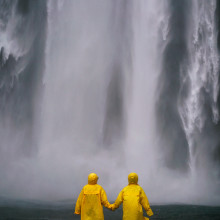
36:54 - What actually makes a waterproof coat waterproof?
What actually makes a waterproof coat waterproof?
Chris put this question to physicist Jess Wade from Imperial College London...
“What actually makes a waterproof coat waterproof?”
Jess - I think this a really nice question because it’s another one of those accidental discovery ones. It’s made out of a polymer, so a polymer is a long chain of carbon atoms all connected together and it’s actually similar to the stuff that I research. But I research conjugated polymers, so there you have single double, single double bonds between these carbons.
Back to the waterproofs - this is a polymer called PTFE (polytetrafluoroethylene) and a guy called Robert Gore, as in GORE-TEX, was playing around with PTFE trying to pull apart rods of this to create a really, really, long thread of it. What they were trying to do was pull apart these rods at really, really, high temperatures, really slowly to eek it out into this really long string to make things that will be really, really sturdy resistant fibres and stuff like that. What he realised, after a long time of playing with this, was that if he pulled it apart incredibly quickly rather than doing it slowly at all, he got this really porous structure. So he generated this structure that had loads and loads of tiny, tiny little holes inside it and that only happened if he did it really, really quickly. So it increased it by 800 times it’s own size and created something that was about 70% air.
This structure’s actually really neat for making clothes out of because it doesn't let water get through, so water drops that you get on the surface - like if you’re outside in the rain on a mountain - don’t get through, but you can let sweat out. So that’s the difference between a waterproof jacket, a jacket that you can wear out and wear it and sweat in, or something that’s just water resistant like PVC that you get really sweaty in and you can’t wear it for very long. It’s because of this porous structure which I think is really neat and it was a complete accident that he did that at all!
Chris - The reason the raindrops won’t come through, but the sweat does, is the sweat’s water vapour, so that’s individual groups of molecules of water which can get through these tiny holes. But by the time they’ve formed a big droplet, that clings to itself very hard and won’t break up into small enough particles to get back through the hole.
Jess - Exactly right. It’s like a sieve. When we have a sieve the holes are exactly the right size to let this tiny water vapour through but they’re too small to let this massive water drop through.
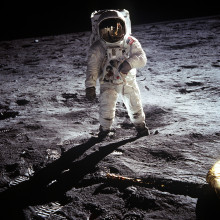
39:10 - How do astronauts cope with temperature and space debris?
How do astronauts cope with temperature and space debris?
Chris put this question to Space Boffin Richard Hollingham ...
Chris - John is with us on the phone. Hello John.
John - Hello.
Chris - You've got a question for Richard.
John - I’d like to know how you overcome the temperature on the surface of the moon in terms of being on there because of the plus temperature when you’re in the light and the minus temperature when you’re in the dark? And also how do you overcome the space debris that’s coming in constantly on the surface of the moon?
Chris - Richard?
Richard -Yeah, and even worse than that is all the cosmic radiation and everything else you’re being bombarded with on the moon. The astronauts that have already walked on the moon during the Apollo missions, they had very sophisticated multilayer spacesuits and we would have them again and you would need those visors. Have you seen those pictures which almost entirely reflects, and you see it outside the space station, this almost mirrored visor over the top? But you’re not going to be outside for a huge amount of time, maybe a few hours at one time.
It is a big issue if you’re going to have a moon base so what they’re looking at is 3D printing a moon base from the lunar surface, so from the rocky, dusty surface itself. I’ve seen the prototype of this in Cologne in the German Space Agency.
Chris - Haven’t Lego got something to say about this? [giggles]
Richard - It’s a printer that goes buzz, buzz, buzz and it’s printing these blocks. It’s not unlike Lego! You have these interlocking blocks you can make out of the lunar regolith and you can build your shelter and that’s where you need to be most of the time. You cannot hang around outside on the moon for a long time.

41:01 - Cyber attacks on the NHS
Cyber attacks on the NHS
with Paul Harris, Secarma
The cyber attacks detected on the 12th May 2017 affected hundreds of thousands of computers across many countries, including the UK's National Health Service. So what happened, and what should we be doing now? Chris and guests Andrew Holding and Kate Feller from Cambridge University spoke to cyber security expert Paul Harris - Managing Director of the Manchester-based firm Secarma...
Chris - First of all, what is this threat that’s brought computers to their knees across the world?
Paul - The attack that happened on Friday 12th May was a ransomware attack and it was called WannaCry. Multiple strains of ransomware attacks are out there currently and this was just one particular type that attacked certain versions of windows software.
Chris - How did people’s computers get infected?
Paul - It was most likely triggered by a phishing email, where people are either encouraged to click on a link, or open an attachment which then downloads malware. In the instance of WannaCry, the payload as it’s called, this ransomware software, then started to encrypt all of the files on the computer that it attacked. That means that they're effectively locked and you can’t unlock them unless you get a decryption key.
What this then went on to do, in this particular attack, was to then searched for other devices and computers on the network and start to attach those, so it spread very quickly. Then once it had attacked all of those computers it would then start pinging externally and look for other computers to attack.
Chris - Do we know where this threat came from?
Paul - No. I think when it started, like most ransomware attacks, the assumption was that it was an individual cyber criminal. It’s probably unlikely we’ll ever find out for certain. There are some interesting theories though around whether this is actually a government attack. So if you think about countries in the world that are posturing at the moment and putting on big displays of their military capabilities. The malware behind WannaCry was actually based on some malware that was out in the world earlier in the year, around January, that was created by a hacking team in North Korea called the Lazarus Group.
Chris - Given that the people who are doing this are asking for a ransom, can we not just see where the money goes and then we go and catch them?
Paul - Unfortunately not, no. Because the cyber criminals’ currency of choice is something called ‘Bitcoin,’ which is a cryptocurrency. So what you can see is their wallet, so you can see money in this wallet. So from the attack from Friday there was about £60,000 put into this wallet. You don’t know who has put money in and you can’t see who takes money out. The reason that criminals like Bitcoin is because there is no central bank, so it’s very, very difficult to trace who has them. And once you’ve got that money, like most criminals, what they do is then launder that through one or two sources to turn it into cash.
Chris - Once your computer has been locked is there no way back without paying the ransom?
Paul - The advice is don’t pay. It does pose quite a difficult question for you. If you're smart you’ll have kept backups, regular backups, and you’ll have system in place to ensure that you’re able to reinstate. It’s a bigger problem for businesses, but if a business is regularly taking backups, and those backups are separated from the network, then you’re much, much safer. If you haven’t got that, then you are faced with a difficult choice, which is do I pay? It’s a relatively small amount of money but, at the end of the day, you’re dealing with criminals and there’s nothing to say that someone won’t come back next week and attack you if you’ve demonstrated that you are able to pay.
Chris - Andrew?
Andrew - My real concern is that I have to use lots of very old Windows computers for my work because they’re attached to a piece of hardware which is worth quarter of a million pounds, maybe more. We don’t have the budget to replace the hardware, even if the computers are cheap to replace, and no-one’s going to write a driver for that hardware. So, what can we do?
Paul - What Microsoft have done following this recent attack is they’ve gone back to software that had been obsoleted by them; they were no longer supporting it. They have gone back and created security patches to try and close these vulnerabilities down. But it’s the way that software companies work; they will only support software for so long and then they move onto their new product, and they want everyone else to move onto their new product.
So you can protect yourself to a degree by all of the basics that we should be doing, which is running patches on our software, particularly critical security patches, running antivirus software, having firewalls, having strong passwords. Not using the same password for everything that we do, which is something that we all do because it’s so much easier. But really - don't! And have really good discipline about emails.
Chris - Kate?
Kate - Are these attackers able to get your data or information off of your computer, or is it just a lockdown?
Paul - Yes. Everybody needs to step away from the idea that you can be safe online because that’s a dangerous concept. We don’t expect our houses, for example, to be completely impenetrable. We accept that there’s a certain element of risk there and it’s the same online.
So cyber criminals, whoever they are, they are after multiple things. They are after your data; they are after credit card information; they want to try and get into your bank account; they’re looking to steal company secrets, military secrets. We’ve all got things digitally that are valuable to us and it is impossible to entirely protect them. It comes down to how valuable is it to you and how much time, and effort, and budget are you prepared to spend protecting it? You can make it very, very difficult and you can make yourself safe from most of these types of attacks, but you’ll never be 100% secure.
Chris - Is it fair to say as well, Paul that sometimes some of these threats, the worst ones are the ones you don’t know about because you could well have things lurking on your computer where the hacker has created for themselves access to your computer and all of your data that Kate’s worried about, and you don’t know that and they can, when they want to, access your computer or call up your computer and use it to do their bidding from afar?
Paul - That’s very true. The majority of cyber attacks are stealthy; they don’t want you to know they’re there. Ransomware is a very noisy attack because you have to be alerted because they want you to pay, but by far the majority of attacks are stealthy. So, yes, you don’t necessarily know and they not always necessarily after you. They might just be taking over your machines to help them attack other people.
Chris - And just to finish Paul - what proportion do you think of people’s computers probably do have malware on them, if you took an average person off the street? I appreciate this is a hard question for you to answer, but plucking a number from the air, with all of the risk attached thereto, what proportion do you think?
Paul - If you think that last year 3.1 billion records were leaked, I think it’s probably fair to assume that most of us have got our data on the dark web. It’s been stolen at some point either from us directly, or from websites that we use, which is why it’s really important to change the information that you have. And if you think in business terms, I’ve seen stats between 50 and 75% of businesses in the UK are reporting cyber attacks last year. So it’s one in two or worse your probability of being attacked.

48:11 - How long are we supposed to live for?
How long are we supposed to live for?
Chris put this question to Andrew Holding from Cambridge University.
Chris - Andrew, an interesting question here from John who asks, ‘How long are we “supposed” to live for?’
Andrew - Well, thank you for that really cheery question. This is actually really interesting though. You can take the very simple idea that your only job as a living creature is to have babies, and then they go on and have more babies. If you take that approach, thirty is probably reaching a ripe old age because by that time you’ve had several babies. The mortality rate for having children is quite high, certainly for women over men, and your job is done.
That isn’t actually what seems to have happened in humans. At some point, we suddenly realised it was actually quite useful to keep old people around to look after the kids when the fit people went off hunting. So we’ve ended up where you find a point somewhere around Neanderthal to Homo Sapiens where the life expectancy starts going up. And, of course, we don’t know if the life expectancy goes up because of social change or a physiological change but we do know it suddenly became very advantageous to keep the old people around to look after your children.
Chris - Jess?
Jess - Is there something about the number of heartbeats that you have as a mammal? Humming birds with crazy numbers of heartbeats a minute have something like a much shorter life.
Andrew - The only thing I’d be careful about is humming birds aren’t obviously a mammal. But, if you look at mammals, like a hamster versus an elephant, you’re absolutely right and we are massively off that. It’s like a line between length of life versus heartbeat rate and humans are off it. They’re completely away from the line…
Chris - I think the point that Jess is eluding to is if you have a higher metabolic rate because you are small, because a hamster or a mouse has to burn a lot of energy to stay warm because it’s losing huge amounts of heat through this enormous body air relative to a tiny core. Whereas, we’re a bit bigger so we don’t have that constraint but yet, if you look at how long we live, it’s out of step with how long we should live and so people are, you're saying, suggesting there must be some sociological reason to keep people in the population? Could it not just be though that the world we grew up in was just so awful when we evolved as a species that we had to breed ourselves to be genetically superfit in order to compete with that environment, and it just means that that gives us this added longevity?
Andrew - Where it gets complicated is the fact that you can’t pass genes on after you have children. But in a way you because if your elder generation is helping, by proxy your offspring are going to survive even though they’re a generation delayed. That’s where it gets interesting because most animals don’t do that, you don’t see a multigeneration survival. And it also means that offspring of a different line survive and that’s when we get these really odd social effects, really hench benefiting a species which you wouldn’t other wise expect to see.
Chris - And we don’t see this, or do we see this in other animals? If we look at whales because they are very long-lived and elephants as well. Is there a similar sort of grandmother effect there?
Andrew - We don’t see this deviation from the heartbeats in anything other than humans as far as I’m aware.
Chris - Even though there are these long-lived animals that live in a big group?
Andrew - No. There’s no evidence for it.

51:12 - Why does hot water help to remove a metal lid from a glass jar?
Why does hot water help to remove a metal lid from a glass jar?
Chris puts this question to physicist Jess Wade from Imperial College London...
“My standard way of opening a stubborn metal lid on a glass jar for the first time is to run hot tap water over the lid. I think the jar opens more easily because the lid expands with the heat. My husband thinks the heat makes the air in the jar expand and this pushes the lid off. Why does the lid come off more easily?" So who’s right?
Jess - I think that you’re entirely right that the lid expands in the heat. The metal lid will expand much quicker than the glass jar that you’ve got, so that will expand and open up and then you can loosen it up. It also has a lower specific heat capacity so when it gets to a certain temperature that expansion happens quicker than the glass that it’s surrounded by.
As you increase the temperature of the gas, the gas will expand but it’s incredibly unlikely to break that seal. But that’s actually why on the top of pasta sauce when you buy it, it’s popped down and that’s because they seal it when it’s really, really hot. And then when it cools down when it’s on the aisle or whatever, that gas starts to sink down and get smaller again so the lid pops down and then you know that you’ve opened it when it pops up.
Chris - Because it does say if you cannot depress this lid you know it’s fresh.
Jess - I don’t buy an awful lot of pasta sauce.
Chris - You would think if the jar air was made hotter, it would then force the lid up and that would actually make it harder to untwist the lid, wouldn’t it if the gas is pushing on the lid and making more friction between the lid and the jar?
Jess - Yeah. I guess it would make it harder and harder to untwist. But what we have in the question, I think, is that the gas will expand so much that it would just cause it to pop up without any untwisting at all.
Kate, you had an interesting theory, right, about using a fork and whacking it?
Kate - Public service announcement! If you take a large knife and you invert it so that it’s the blunt edge of the knife and you just give a swift whack to the edge of a metal lid, it works almost every time - it’s perfect.
[giggles]
Related Content
- Previous Can sperm survive in space?
- Next What is Wannacry?










Comments
Add a comment